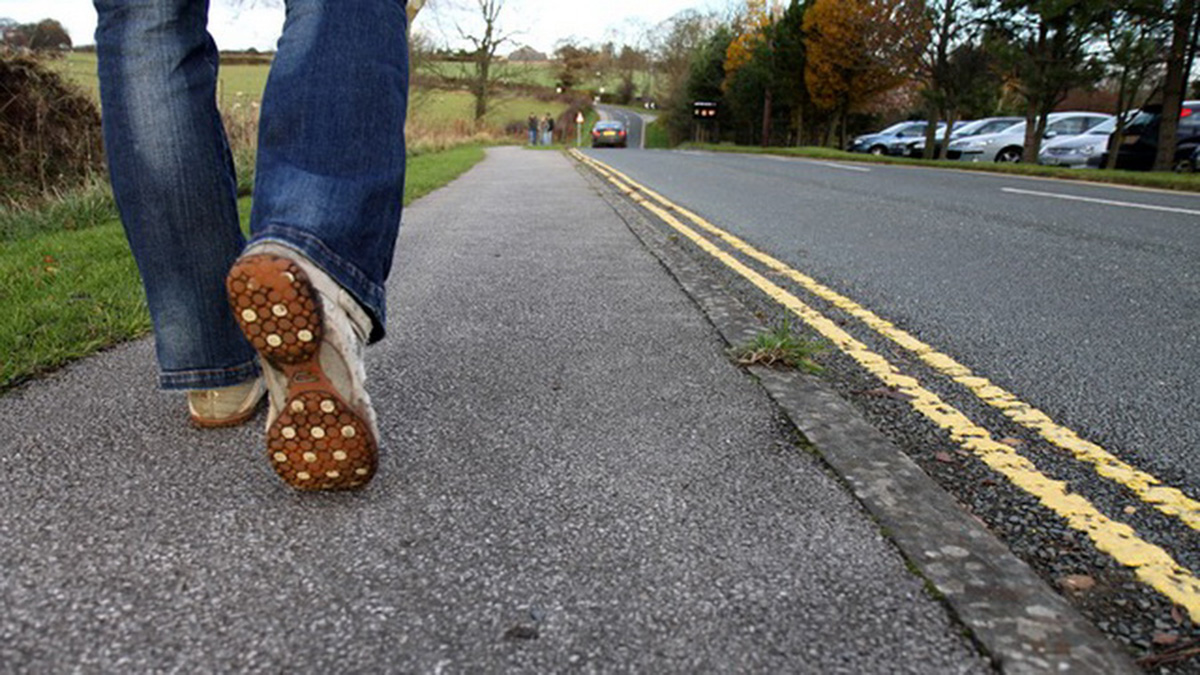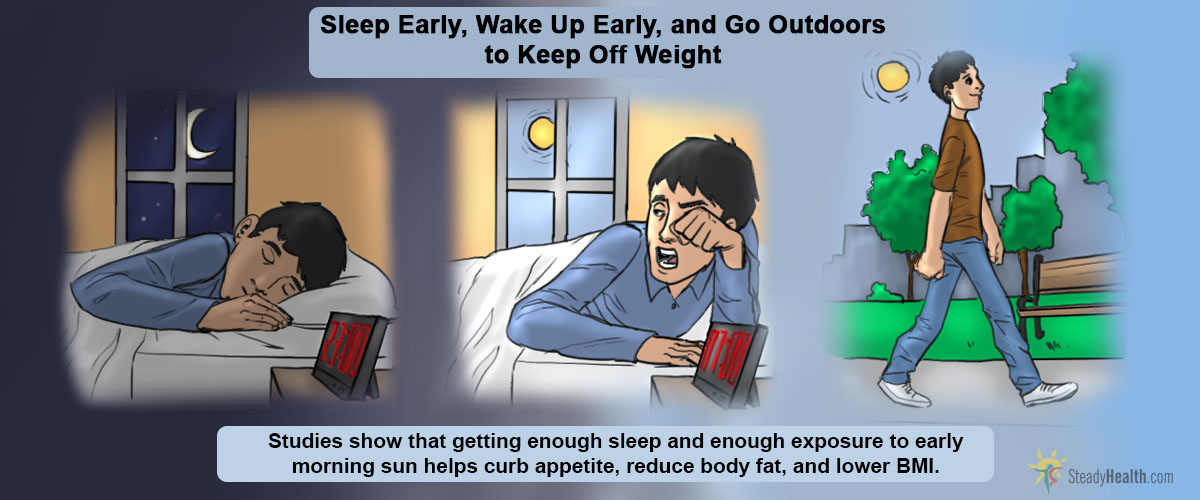Are you an owl or a lark? When it comes to your sleeping and waking habits, you may be an owl if you sleep late and wake up late, or a lark if you sleep early and wake up early. Whatever your habits are, new studies suggest that synchronizing your internal body clock with light exposure may help you regulate your weight. Research shows that making circadian health an important part of your lifestyle can help prevent obesity, which is now becoming a major health problem all over the world.
People Do Not Get Enough Morning Light
Many people do not get enough natural morning light, partly because of their lifestyles, which includes their jobs and personal habits. Although other people get up early in the morning to go to work or to school, most of them stay indoors in their offices, schools or homes for most of the day. Others stay up late up night, by choice or working night shifts, and wake up later in the day. Could these lifestyle factors influence the current overweight or obesity problem many people have?
Many studies have found that sleeping late and short sleep duration are linked with higher body mass index (BMI, a measure of body fat). These conditions are associated with lower exposure to natural morning light.
Other studies also suggest that sleep duration and light exposure may influence metabolic function, body fat, and appetite. Sunlight is a natural source of vitamin D. Adequate vitamin D levels are associated with better weight management, as it plays a role in metabolism and can help reduce the risk of obesity-related conditions. One intervention study involving obese women has shown that receiving sunlight in the morning for at least 45 minutes for three weeks reduced appetite and body fat. A similar study comparing the effects of exercise alone versus light exposure and exercise in obese women found that greater reductions in body fat were achieved with the latter intervention. However, there is little evidence that the timing and intensity of exposure to early morning light influences body weight.
Bright Morning Light and Body Weight
See Also: 11 Reasons to Start Walking Now
According to senior author Dr. Phyllis C. Zee, light is the most potent factor which synchronizes your internal body clock and regulates the circadian rhythm. This in turn, regulates energy balance, so that one should get more bright light between 8 and 12 in the morning. Getting about 20 - 30 minutes of sunlight is enough to influence BMI. Zee is a professor of Neurology and is the director of the Northwestern Medicine Sleep and Circadian Rhythms Research Program at the University.
Sleep Early, Wake Up Early, And Go Outdoors
Not everyone can sleep early and enjoy the morning sun, as health experts would suggest. Most of us grab a cup of coffee, get into our cars and stay in the office till sunset. Others stay in bed with their curtains drawn, until it is time for their shift at work. Very few are able to get natural morning light exposure between 8-12 am, when the light is more intense.

For the study, which was published recently in the journal PLOS ONE, 54 adult participants were asked to wear wrist actigraphy monitors that measured the amount of light exposure and sleep they got for seven days under normal living conditions. Their estimated calorie intake was measured from a food log each of them made for the duration of the study.
Most people are usually exposed to only 100 to 200 lux, which is equivalent to light intensity indoors. They found that those who had greater exposure to morning light were more likely to have lower BMIs, regardless of their calorie intake or amount of physical activity.
The authors believe that appropriate exposure to daylight, with regards to timing, duration, and intensity must be encouraged as part of a healthy lifestyle. This can be done by having more windows that allow natural light into schools and workplaces. Indoor lighting could be improved to increase brightness. Children and employees must be able to go outdoors on breaks. This type of intervention is a simple solution to obesity, which is easy to follow, since light is a factor that could be modified.
Lose Weight Naturally
Obesity is not just a weight problem; it is now considered a chronic disease, since it affects the overall health of the individual. It is linked to other chronic diseases such as heart disease, diabetes, stroke, arthritis and more. It affects even our children and can become a life-long problem. While many people are lured to use various products that promise rapid weight loss, more studies are finding evidence that there are many ways one can regulate weight naturally. Doctors and other health experts always advise people to eat a healthy, balanced diet that includes a variety of foods, and to exercise regularly to maintain a healthy weight.
But we must also consider other modifiable lifestyle factors that may affect weight, including getting enough sleep, reducing stress, and avoiding unhealthy practices such as smoking and excessive alcohol intake. Although many people try to hit the gym after a day's work, this new study suggests that it is not enough to exercise, but it may be better to get some morning sunlight while walking to work or playing with your kids. Even on a cloudy day, natural outdoor light provides more light intensity than normal indoor lighting.
Morning sunlight can help improve mood and reduce stress. When you're in a better mental state, you're more likely to make healthy food choices and engage in physical activities, both of which contribute to weight management. Being exposed to natural light in the morning can encourage outdoor physical activity, such as walking or jogging. Regular exercise is crucial for weight management and overall health.
See Also: Walking Preserves Much More Than Just Your Waistline
The new study also supports previous findings that treatment with morning bright light reduces appetite and body fat, as seen in overweight and obese women.
- Reid KJ, Santostasi G, Baron KG, Wilson J, Kang J, et al. (2014) Timing and Intensity of Light Correlate with Body Weight in Adults. PLoS ONE 9(4): e92251. doi:10.1371/journal.pone.0092251 http://www.plosone.org/article/info%3Adoi%2F10.1371%2Fjournal.pone.0092251
- Northwestern University. "Morning rays keep off pounds." ScienceDaily. ScienceDaily, 2 April 2014. http://www.sciencedaily.com/releases/2014/04/140402212531.htm
- Danilenko KV, Mustafina SV, Pechenkina EA. Bright Light for Weight Loss: Results of a Controlled Crossover Trial. Obes Facts 2013,6:28-38. http://www.karger.com/Article/FullText/348549
- Mindmap by steadyhealth.com
- Photo courtesy of PublicDomainPictures by Pixabay : pixabay.com/en/walk-shoes-shoe-leg-pavement-2021/
- www.plosone.org
- www.sciencedaily.com
- www.karger.com



Your thoughts on this